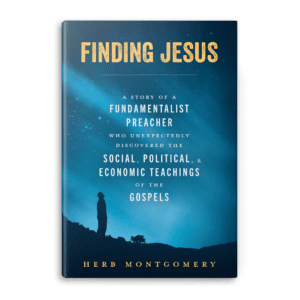
Is there anything life-giving we could take from this section of our reading? I do find it puzzling that these themes starkly contrast with how some Christians today in the U.S. are seeking political power to enforce their own interpretations of morality on society rather than seeking more effective ways to serve and lift the burdens of those who are most harmed by our systems.
Welcome Readers! Please subscribe to Social Jesus Here.
(Read this series from the beginning at Part 1 and Part 2.)
In Mark’s gospel we read a story that’s relevant here:
“When the ten heard about this, they became indignant with James and John. Jesus called them together and said, ‘You know that those who are regarded as rulers of the Gentiles lord it over them, and their high officials exercise authority over them. Not so with you. Instead, whoever wants to become great among you must be your servant, and whoever wants to be first must be slave of all. For even the Son of Man did not come to be served, but to serve.’” (Mark 10:41-45)
Matthew repeats this theme three times:
At that time the disciples came to Jesus and asked, “Who, then, is the greatest in the kingdom of heaven?” He called a little child to him, and placed the child among them. And he said: “Truly I tell you, unless you change and become like little children, you will never enter the kingdom of heaven. Therefore, whoever takes the lowly position of this child is the greatest in the kingdom of heaven. And whoever welcomes one such child in my name welcomes me.” (Matthew 18:1-5)
Jesus called them together and said, “You know that the rulers of the Gentiles lord it over them, and their high officials exercise authority over them. Not so with you. Instead, whoever wants to become great among you must be your servant, and whoever wants to be first must be your slave—just as the Son of Man did not come to be served, but to serve, and to give his life as a ransom for many.” (Matthew 20.24-28)
And here in our reading this week:
“The greatest among you will be your servant.” (Matthew 23:11)
These passages in Matthew have aways made me scratch my head when I consider how so many Jesus communities and institutions are structured today. Why aren’t our Jesus communities more egalitarian? Today we have all manner of escalating positions of authority and titles in our communities, and I wonder:
- What would Christianity look like if we practiced more egalitarianism with each other?
- Would we still argue over who could be pastors and who couldn’t based on gender?
- Would we argue over who could be members or who couldn’t based on their identities and orientations rather than their ethical practices?
- How could taking seriously the egalitarian themes of this week’s readings transform our Jesus communities. Would that bleed through into how we relate to our larger society?
- Would we seek to serve others more than obtain ecclesiastical and civil positions of power and authority?
Again, these passages have always challenged me as I consider the way we structure ourselves as Jesus followers. I have more questions than answers, but these questions have always given me pause as I seek to follow a more egalitarian practice in my work and life.
Matthew ends this section with themes of reversal from ancient Jewish wisdom and I think it may be a great place for us to land this week, too:
“You save the humble but bring low those whose eyes are haughty.” (Psalms 18:27)
“When pride comes, then comes disgrace, but with humility comes wisdom.” (Proverbs 11:2)
 Herb’s new book, Finding Jesus: A story of a fundamentalist preacher who unexpectedly discovered the social, political, and economic teachings of the Gospels, is now available at Renewed Heart Ministries.
Herb’s new book, Finding Jesus: A story of a fundamentalist preacher who unexpectedly discovered the social, political, and economic teachings of the Gospels, is now available at Renewed Heart Ministries.














